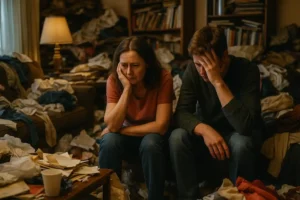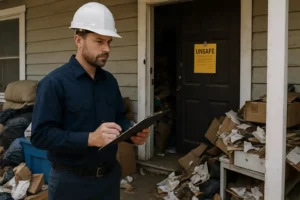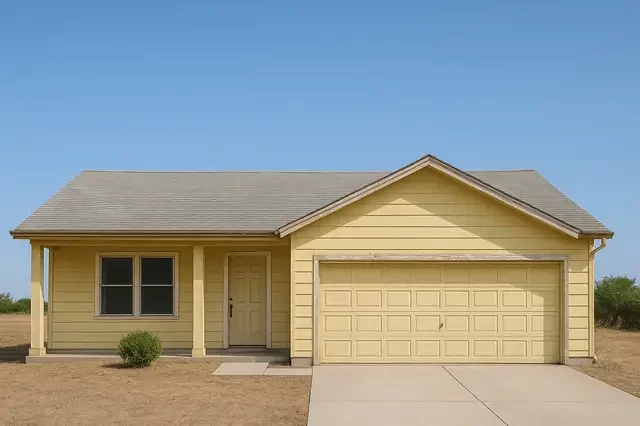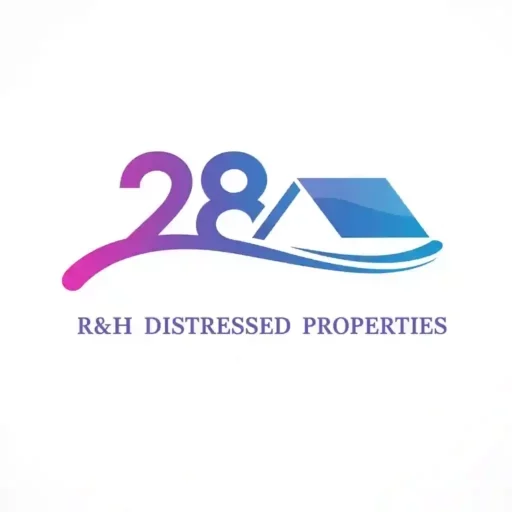
Hoarding is more than clutter — it’s a serious mental health condition that can create major safety hazards and even legal consequences for homeowners, landlords, and family members. If you’re responsible for a hoarder house in the Bay Area, or any part of California, it’s crucial to understand your rights, responsibilities, and the legal risks involved.
Whether you’re overwhelmed by the condition of a property or facing mounting pressure from neighbors or code enforcement, this guide will help you make informed decisions.
Understanding Hoarding Disorder and Its Impact in California
Hoarding disorder involves the persistent difficulty discarding possessions, regardless of their actual value. For individuals struggling with hoarding behavior, letting go of items can trigger anxiety or distress. Unfortunately, excessive accumulation of belongings can lead to unsafe living conditions, structural damage, and public health concerns.
In many cases, family members or landlords are left to manage the fallout — often without knowing where to turn or what legal risks exist.
Health and Safety Hazards Inside Hoarder Homes
🔥 Fire and Structural Risks
Stacks of paper, cardboard, and clothing make hoarder homes highly flammable. Blocked exits and overloaded electrical outlets are common and can quickly turn dangerous. If a fire breaks out, not only is the resident at risk — so are nearby homes and emergency responders.
Structural damage is also common. Floors can collapse under the weight of excessive clutter, and walls may become unstable due to moisture, mold, or pest infestations.
🐀 Mold, Pests, and Unsanitary Conditions
Food waste, animal droppings, and poor ventilation create environments where pests and mold thrive. These conditions violate public health and safety laws in many California cities and can trigger fines, forced cleanup, or property condemnation.
Legal Responsibilities for Homeowners and Landlords

As a property owner in California, you’re responsible for maintaining habitable, safe conditions — even if the clutter was caused by someone else. Severe hoarding can lead to:
- Building code violations
- Fire safety violations
- Health department complaints
- City-mandated cleanup or abatement
- Legal action or fines from local governments
- Property seizure in extreme cases
Landlords must also maintain habitable units, even if tenants create unsafe conditions. If a tenant with hoarding disorder creates fire or health hazards, documentation and legal consultation are critical before taking action.
Tenant Rights and Reasonable Accommodations
Hoarding disorder is recognized as a mental health condition, and tenants with documented diagnoses may be protected under fair housing laws. This means landlords may be required to provide reasonable accommodations, such as additional time or support for clean-up.
However, safety still comes first. If excessive clutter poses a fire hazard or affects neighbors, legal eviction may still be possible — but only with proper legal steps. Always consult a real estate attorney to stay compliant and avoid discrimination claims.
Community Complaints and Involuntary Cleanup
When neighbors file complaints about a hoarder house, local authorities can act quickly. Many cities in California classify these properties as public nuisances and may:
- Issue violation notices
- Demand immediate clean-up
- Charge the owner for abatement
- Place a lien on the property
- In extreme cases, condemn the home
Involuntary cleanup can be costly — and lead to loss of the property entirely.
Getting Help: Professional Support and Services

Addressing a hoarding situation takes more than just a dumpster. Many families benefit from the support of:
- Mental health professionals
- Organizers and junk removal services
- Support groups for hoarders and family members
Early intervention can prevent escalation and help the individual get the treatment and compassion they need — while protecting your legal interests.
💡 Need to Sell a Hoarder House in California?
If the situation has become too overwhelming — or you’re facing legal action, fines, or condemnation — it may be time to sell the property.
At R&H Distressed Properties, we specialize in buying hoarder homes in any condition, all across California. You don’t need to clean, repair, or even remove items — we’ll take care of everything, including the paperwork and cleanup.
✅ No inspections
✅ No agent fees
✅ No judgment
✅ Fast, fair cash offers
📞 Call (916) 436-7460 or visit www.rhdistressed.com to request your free, no-obligation cash offer today.
Conclusion: Be Informed, Take Action Early
Hoarder homes pose serious health and legal risks — but with the right support, they can be managed or sold. Don’t wait until the city posts a notice on the door. If you’re dealing with code violations, unsafe conditions, or a distressed family member, act now.
Get legal advice. Seek professional help. And if you’re ready for a fresh start, R&H Distressed Properties is here to offer a compassionate, confidential cash solution. We buy hoarder homes across California — view all service areas here.
Don’t Wait Until It’s Too Late.
If your property is at risk due to excessive clutter or hoarding issues, the legal consequences could escalate fast – code violations, fines, or even property seizure. Take control now.
👉 Fill out the form below to get a no-obligation cash offer today.
R&H Distressed Properties can help you sell fast, as-is, and avoid legal headaches. Time matters—act before the situation worsens.

